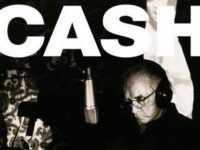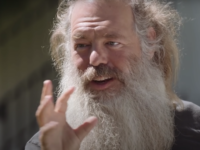J.R. Cash, as he was christened, made his first fan early on: Cash’s mom played guitar for him, and suggested after a few singalongs that her son get some formal training. During those lessons, he made his second fan – a woman who lent an ear to Johnny Cash’s earnest, bone-deep singing. She told him to forget about training.
Good advice: As late as the mid-1990s, Cash was probably the best-known country singer around. Yet, in a time when the genre was making a head-long rush toward pop, nobody listened to his music. There were still more fans to be made. Namely, producer Rick Rubin.
Rubin had established himself as a rap producer, then later delved into a series of interesting side projects, including Rolling Stones frontman Mick Jagger’s Wandering Spirit and Tom Petty’s Wildflowers, among others. Even so, when Rubin called Cash about doing a record, it was hard – especially, it’s said, for the country legend himself – to picture this shaggy outsider reviving a then-fallow career. But did he ever.
Released on April 26, 1994, the lean, yet shockingly full-bodied American Recordings was the best country album of that year, and one which finishes among the top ranks of any that the legendary Johnny Cash ever issued. And that’s saying something. (A series of four subsequent collaborations then followed in advance of Cash’s 2003 death.)
By turns brooding and funny (“The Man Who Wouldn’t Cry”), sobering (“Beast in Me”), and down-right scary (“Delia”), American Recordings covers the sweep and depth of our country’s hopes and fears. Johnny Cash, even until the end, didn’t shy away from those tough questions, even if he somehow knew that the answers wouldn’t follow. Left behind by the industry, Cash never stopped holding his ground – and his return was as unique as it was complete.
We hear Cash accompanying himself on solo guitar for the very first time, and keep reminding ourselves that it’s on a late-period project done with the guy who once helmed hits by Public Enemy, the Beastie Boys, Run-DMC and the Red Hot Chili Peppers. Meanwhile, two of the tunes were cut live at the movie star-hip Viper Room in Los Angeles. Though confronted by a group of those too young to remember anything about a boy named Sue, Cash showed up, again, in black and told this story, again, about the Tennessee Stud – a fine, dirt-old fable.
Johnny Cash, you were reminded, always challenged convention and questioned the deciders. In a sea of hat acts, his brave old world – forever captured on the superlative American Recordings – was a shimmering life preserver once more.
- The Bright Spots in George Harrison’s Troubled ‘Dark Horse’ Era - December 29, 2024
- The Pink Floyd Deep Cut That Perfectly Encapsulates ‘The Wall’ - November 29, 2024
- Why Pink Floyd’s ‘The Endless River’ Provided a Perfect Ending - November 11, 2024



